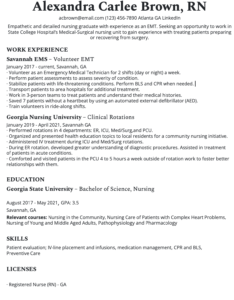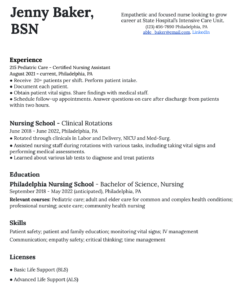New Nurse Graduates / Resume Guide & Templates
With the NCLEX board exam behind you, it’s time to land your dream job. You know, the one that makes you excited to get out of bed in the morning. But maybe you’re running into job search roadblocks. Most of the best jobs with the highest salaries say, “one year of nursing experience required.” But how can you get a job as a new nurse without experience? Here’s some advice for new grads.
This new nurse resume guide will walk you through every step of resume writing, with examples and clear directions. You’ll learn how to describe yourself and your experience to stand out from the crowd.
- How do you write a new nurse resume?
- How do you format your new nurse resume?
- How do you optimize for ATS?
- What do you add to your contact section?
- How do you write an objective?
- How do you highlight your skills?
- How do you describe your experience?
- How do you organize credentials and education?
- What else can you add to a resume?

How do you write a new nurse resume?
Your resume must be professional, clear, and easy to read. It should contain three basic parts: summary, education, and experience. There are also other optional sections to consider to bulk up your resume.
Today’s healthcare hiring managers are busy. Most employers use applicant tracking systems (ATS) to screen candidates before reading their resumes. New nurses need the right resume to stand out in today’s market.
That’s why we are giving you the steps to format and optimize your resume with the right contact and objective information hospitals and healthcare facilities want to see.
New Nurse Resume Templates
How do you format your new nurse resume
Don’t overlook the format of your new nurse resume. Here are some guidelines:
- 1” margin
- Align text to the left
- Standard font like Arial or Times New Roman
- Adjust the size of your text to highlight different sections, but avoid using more than three different sizes
Your name will be the headline of the resume. Use a 16-18 point font size and center it. Then create headings for the main sections.
When applying for a job with little or no work experience, consider placing your education before experience on the resume.
Then list background details in reverse chronological order, meaning the most recent first. Try to keep your new nurse’s resume to one or two pages.
How do you optimize your new nurse resume for ATS?
Automated ATS software skims resumes to highlight well-qualified candidates for the hiring managers. They also reject up to 75% of applicants.
The most effective way to optimize for ATS is to use the job post’s exact wording. For example, if a job position says “bilingual” but you put “fluent in French” on your resume, the system may not recognize that you meet the qualification. Use keywords from the job post in your resume where you can.
Other simple tips include:
- Spell out acronyms, such as “Graduate Nurse” instead of GN.
- Use the .docx, .doc, or .pdf format to save your resume
- Avoid headers and footers on the page
- Keep bullet points simple, avoid using symbols, arrows, or other special characters
- Do not use logos, photos, or tables that are unrecognized by ATS scans
If you want to see how your resume will do with ATS, try a free online resume tool to give you tips to improve your score.
Get job matches in your area + answers to all your nursing career questions

What do you add to your contact section?
Your contact information goes at the top of your resume with your name to tell employers how to reach you. Here’s what you want in the contact section:
- Location: Provide the city and state abbreviation where you are located.
- Phone number: Employers need a good phone number to reach you. Keep in mind that some employers use text messaging for communication as well.
- Email address: Use a traditional email address for correspondence. Avoid snarky or inappropriate email names. One study found that unprofessional email addresses give the wrong perceptions about candidates.
If you have a professional profile such as LinkedIn, you may include it in your contact section. Omit http:// in the site address to save space.
How do you write an objective?
The objective section is also known as a summary. It should contain two or three sentences to summarize your skills and expertise. Experts agree that the objective is critically important to your new nurse’s resume. It must GRAB the hiring manager’s attention. Use exact terms from the job posting, such as “Registered Nurse” and “RN license.” Clearly state who you are and why you’re the best candidate. Here are a few tips to help you craft this important section.
- Imagine you are recommending yourself for the job; what would you say in two sentences?
- Ask a friend or mentor to help you write it.
- Look up examples online for direction.
- Avoid clichés like “highly motivated.” They don’t grab anyone’s attention.
Lead with your license and certifications, then highlight a few skills that make you an attractive candidate.
Draft an objective and then ask three close friends or relatives for feedback. Take their suggestions and tweak your objective until it’s perfect.
How do you highlight your skills?
Your new nurse resume will look different from the resume of a nurse with decades of experience. New grads should highlight all of their abilities, not just nursing skills. A good rule of thumb is to include hard and soft skills.
- Hard skills are abilities you learn in school or on the job. Examples include assessing vital signs or inserting a catheter.
- Soft skills are attributes and personal qualities that help you perform job tasks. Examples include time management, leadership, and multitasking.
As a new nurse with little work experience, you can create a great resume by emphasizing soft skills that make you right for the job.
To highlight the skills, make bullet points under experience and education. Make phrases concise and easy to understand.
Top nurse jobs on Incredible Health
Emergency Department / ER Nurse (RN)
Pembroke Pines, FL | $49,490 to $100,000 /year
Nurse Practitioner – Urology
Melrose Park, IL | $86,000 to $131,000 /year
Registered Nurse – Neuro ICU Assistant Manager
Burlington, MA | $75,000 to $150,000 /year
Staff Nurse (RN), Med Surg
Shelby, MI | $59,640 to $77,630 /year
Staff Nurse (RN), Med Surg
Patchogue, NY | $73,450 to $127,496 /year
Get matched with these and thousands more permanent jobs on Incredible Health.
How do you describe your experience?
Experience is the substance of a resume. It is what the hiring managers want to see. Start this section with a bolded, easy-to-find header such as “Work Experience” or “Employment History.” Under the header, list your work history, including place of employment, job title, and dates.
New nurses wonder how to describe their experience when they don’t have any, or past work experience that doesn’t relate to nursing. The key is to keep an open mind about your experience and how to describe it on your resume.
My personal story is a perfect example. After nursing school, my only work experience was at a restaurant, so I put those details in my resume. I got the interview and soon found myself describing my experience to the unit nursing manager: dealing with customers, running trays to tables, putting in orders, and cleaning tables.
You know what? I got the job! The manager gave me a tip. She said, “You may think restaurant experience doesn’t count, but what you described IS A LOT like nursing. You will care for patients instead of customers, there will be a lot of running, you’ll be waiting on orders from doctors, taking specimens to the lab.” And she was right.
Bottom line: Don’t discount your experiences. Every job teaches you something. Consider your experience and how it prepared you for your next job. Then write clear, specific bullet points to show off your experience. Start each bullet point with an action word such as “obtained,” “collaborated,” or “managed.”
You can also use volunteer or unpaid work as work experience. For example, if you served as a Girl Scout leader and are applying for a pediatric job, that experience is relevant. Any recent work experience that hits on the keywords of the job post should be included.
And don’t forget to include your nursing school experience! For a new nurse resume, include relevant classes and experience you gained. An example entry for nursing school experience might look like this:
Incredible Hospital – Clinical Rotation
January 2022-May 2022
- Rotated through 3 departments, including Intensive Care Unit, Surgical Recovery, and Pediatric Surgery
- Performed Cardiopulmonary Resuscitation during Intensive Care Unit rotation with 100% success for patients who were coding
- Assisted nursing staff in triaging the severity of patients’ conditions by performing detailed nursing assessments and obtaining vital signs
- Learned about various lab tests vital to the diagnosis and treatment of patients in the Intensive Care Unit and Surgical Unit
Highlight noteworthy contributions you made and what you learned.
Get job matches in your area + answers to all your nursing career questions

How do you organize credentials and education?
When it comes to your new nurse resume, an easy way to show off your credentials and education is to mirror the industry-standard order for properly displaying nursing credentials.
- Education: Start by listing your degree type, major, and years you studied. If your school is well-known, include it. And if you achieved honors or earned a grade point average over 3.5, you should list that too.
- License: List your nursing license type (RN, LPN, LVN), state of licensure, and expiration date. If your nursing license is a compact or multi-state license, note that.
- Certifications: List certifications you have next. State the name of the certification and acronym. For example, “Cardiopulmonary Resuscitation (CPR).” Include the name of the certifying organization and expiration date.
- Awards and Honors or other recognitions: Include any additional awards, scholarships, certificates, or achievements you obtained that would be attractive to employers.
You can create separate sections for “Education,” “License & Certification”, and “Awards & Honors.” Or you can put them all under a single heading titled “Credentials” to save space.
What else can you add to a resume?
Now that you have compiled your resume, you can put on the finishing touch by adding details that show who you are. Consider making sections that showcase what sets you apart from other applicants.
- Languages: If you know other languages, share this with employers! Bilingual nurses have a competitive edge.
- Hobbies and Interests: A shared hobby or interest might grab an employer’s attention. It also gives the hiring manager an idea about your personality.
- Volunteer Experiences: List causes or organizations you are passionate about. Volunteering your time, energy, and resources shows employers you care.
- Courses or Conferences: If you have taken courses (even as a part of your nursing program) or attended conferences, list them! Examples might include a Child Abuse Awareness course, a local Emergency Preparedness course, or a conference through your church. You can even find free nursing courses on Incredible Health to take right now!
Before you finish your resume, take a day or two to think about experiences you’ve had that you can add to show who you are and why you are the best pick for the job. Ideas will come.
Next Steps
Now you’ve written a professional, scannable, engaging resume complete with objectives, skills, experience, education, and a few showcase details. Next, get a colleague or friend to proofread it. Use a free online resource like online-spelcheck.com to prevent spelling and grammar errors.
When your resume is ready, it’s time to send it out. If you need help with your job search, you can find more nursing job search resources and guides on Incredible Health. Check your email daily for responses and be ready to find the perfect job!
Sources
- “Hip Email Addresses Bad for Resumes”. livescience.com. Accessed May 4, 2022.
- “How to Get Your Resume Past the ATS Scans (2021 updated)”. zipjob.com. Accessed May 4, 2022.
- “How to Write a Resume That Stands Out”. hbr.org. Accessed May 4, 2022.
- “Improve your resume and LinkedIn profile”. resumeworded.com. Accessed May 4, 2022.
- “Online-spellcheck.com”. online-spellcheck.com. Accessed May 4, 2022.
- Photo by João Ferrão on Unsplash
Get job matches in your area + answers to all your nursing career questions



